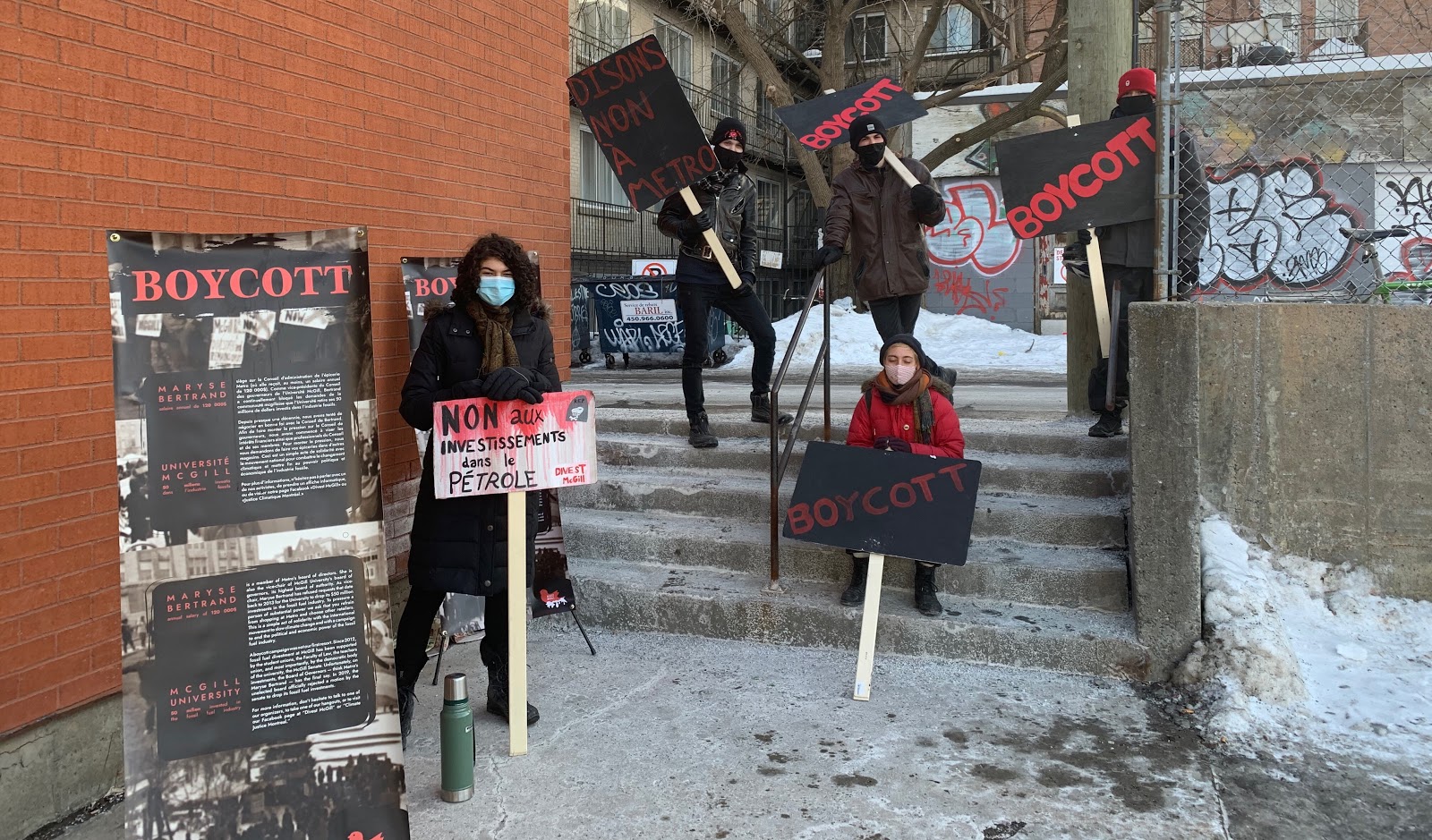Five members of Divest McGill met to picket outside the Plateau’s St-Hubert Metro location on March 8 as part of a boycott campaign launched in summer 2020. The small but energetic crowd wielded signs in front of the store for over one hour, braving temperatures below freezing as they engaged Metro customers and passers-by into conversation about the campaign.
The boycott Metro initiative, which was kickstarted by Climate Justice Montreal in June 2020, is aligned with Divest McGill’s call for the McGill Board of Governors (BoG) to divest investments from their holdings in some of the top 200 fossil fuel companies. According to Sofia Mucci, U3 Arts and Divest McGill member, the goal of the boycott is to put pressure on BoG Vice-Chair Maryse Bertrand—a key BoG member against divestment—by targeting her personal investments and involvement in Metro Inc.
“We are specifically targeting Metro because the Vice-Chair of the Board of Governors is Maryse Bertrand, who earns a salary from Metro Inc. and wields power there,” Mucci said. “We are putting pressure on her by attacking her financial assets.”
Mucci explained that the boycott campaign relies on public engagement and emphasized the curiosity that some customers have shown toward the initiative.
“Some people will come to us with questions, especially younger people,” Mucci said. “Especially because of COVID, people often really want to have conversations with strangers, so they are willing to talk to us.”
According to a 2020 report, Bertrand earned a retainer of $131,660 from her investments with Metro and held over half a million dollars in shares. Samuel Helguero, L2 Law and Divest McGill member, explained that targeting Betrand is not the sole factor behind the boycott of Metro.
“[Metro] is an oligopoly,” Helguero said. “Along with a couple of other industry giants, Metro cut their worker’s pandemic pay, but still, at the end of the year, gave their executives […] the near-maximum bonus they could have given to their five top executives.”
Laura Doyle Péan, L2 Law and a Divest McGill member, hopes that the campaign will help stoke a broader conversation about the BoG’s powerful role within the McGill community.
“We are hoping to find ways to get rid of the Board as it currently exists and replace it with something that would allow […] the McGill community to have a say,” Péan said. “We are looking into recruiting people from different subgroups that form the McGill community and all have an interest in democratizing how decisions are made.”
Helguero said the effectiveness of targeted boycotts lay in their focus on targeting money flows as a powerful form of leverage to influence professionals and key decision makers.
“When you start targeting people’s financial and professional interests, they really have to think about what they are doing,” Helguero said. “There are only so many people that can be convinced when you have hit the democratic walls, because then you [have to] appeal to the moral and intellectual sensibilities of people [….] Many sit on national banks or on the boards of Metro, or have worked for the fossil fuel industry before, like Cynthia Price Vereaux, who worked for Petro-Canada for 18 years.”
Helguero reflected on the course of the campaign, and looked ahead toward educational initiatives that he hopes will spring from the boycott.
“Maryse Bertrand is now part of a company [that has] a boycott […] against it by environmental activists,” Helguero said. “Hopefully in the future we will be able to use the boycott as a bouncing off point to talk about fossil fuel investments in Canada.”








